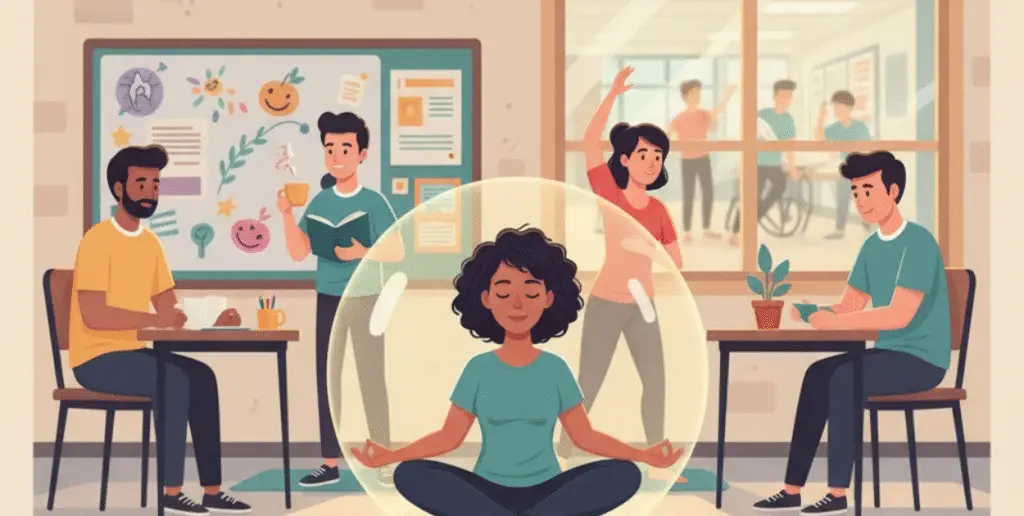
The world relies on educators to help shape and guide students of all backgrounds. Society puts so much expectation on educators, but doesn’t always consider their needs. After all, teaching is a tough job, which sometimes involves many unpaid hours spent grading papers and crafting lesson plans.
That doesn’t include the personal responsibilities that teachers must take care of in their free time. Juggling all these responsibilities can make prioritizing self-care quite difficult. Whether it be your diet, exercise schedule, sleep habits, or mental health, many factors play into self-care.
Self-care is essential for all teachers, but it’s even more important in high-need environments. High-need classrooms require special care, and your mood can greatly impact your students. Follow along as we explore why self-care is essential for educators working in high-need environments.
Self-Care Affects Each Aspect of Teaching
The average teacher would probably do everything they could to give their students the best experience. However, this requires some careful self-reflection, and you may need to change some of your habits to make this possible. Leaning into self-care can pay off in many important ways, such as:
1. Your Mental State Affects Your Performance
Self-care encompasses both physical health and mental health. However, your mental health and state of mind are so essential to your work as a teacher that they can significantly affect your performance. Teaching in high-need environments can be stressful, and how you manage that stress can largely dictate your experience and performance.
For example, ignoring stressors or dealing with them poorly can make you emotionally distant and disconnected from your work. This can impact you and your students alike, and they may not have the same experience as they deserve. Whether you’re chronically sleep-deprived or stressed about personal problems, you may bring your struggles to work.
Setting boundaries between work life and home life is one of the most important self-care tips for teachers. Getting enough sleep, exercising regularly, and eating a healthy diet can also improve your performance.
2. You Can Cultivate a Positive Environment
Educators are more influential than they sometimes think. If you don’t take care of yourself, it can easily affect your mood, which students may notice. Many people can likely recall instances when their teachers were cranky, as it can set the tone for the day or the week.
Naturally, you’re supposed to set a good example as an educator. The best way to do so is to exemplify health practices, both physically and mentally. This can be as simple as mediating arguments between classmates and showing them how to handle disagreements in healthy ways.
In doing so, you can show students how their behavior affects others. Of course, this will only work if you stay positive and practice what you preach. Keeping students engaged shouldn’t be difficult if you take care of yourself and keep yourself in check before, during, and after work.
3. Handling Unexpected Issues is Easier
Dealing with some of the unexpected problems that educators deal with can be tricky, even if you take great care of yourself. However, navigating long hours, struggling students, and staff shortages is quite difficult without self-care. You never know when stressful situations will arise, and dealing with them is much easier if you’re healthy.
After all, how can you quickly respond to problems in the classroom if you’re burned out and sleep-deprived? High-need classrooms often entail many variables, both behaviorally and academically. A well-rested, healthy teacher can more easily address unexpected matters in healthy ways as they arise.
Mental clarity is the most important byproduct of self-care, and it makes navigating even the most stressful situations easier. The better you feel, the more easily you can explain your expectations and influence your students to act accordingly. This can minimize issues and ensure they get handled quickly and efficiently.
4. You Can Enjoy Your Job Much More
Teaching in high-need academic settings takes a lot of hard work, but it can be so rewarding. However, it’s hard to enjoy yourself when you feel run down, worn out, stressed, and unhappy. Most people become teachers because they’re passionate about teaching, but that passion can fade.
That’s especially true if you’re overworked, tired, and unable to manage your anxiety. In that case, you must do anything you can to get your mental and physical health in check. Therapy is more available than ever thanks to telehealth services, and it’s worth exploring.
It’s also important to establish a sleep schedule and stick to it to ensure you have energy at work. Similarly, you must advocate for yourself if your hours or pay rate cause you a lot of stress. Addressing all these common issues can help you enjoy your job more and perform much better.
Taking Care of Yourself Can Help You and Your Students
Students are impressionable, and they pick up on more things than some teachers may realize. Even if they don’t, you will at least influence the classroom’s mood if you act differently because you’re unhealthy. By setting personal and professional boundaries, you can use your free time in healthy ways.
Doing so can ensure you go to work feeling refreshed, and it can help you develop healthy coping mechanisms. Stressful situations may still arise in your high-need classroom, but they don’t need to torpedo you or your students. Make self-care your top priority, and everything else will fall in line, whether it be at home or at work.
Mariam holds an MS in Sociology with a specialization in Medical Sociology and Social Psychology. With a strong academic background and extensive research work in both fields, she brings depth and clarity to complex topics. Her writing explores the intersection of society, health, and the human mind, making academic ideas easy to grasp and relevant to everyday life.


